Charles E W Bean, Diaries, AWM38 3DRL 606/245/1 - 1915 - 1925 - Part 6
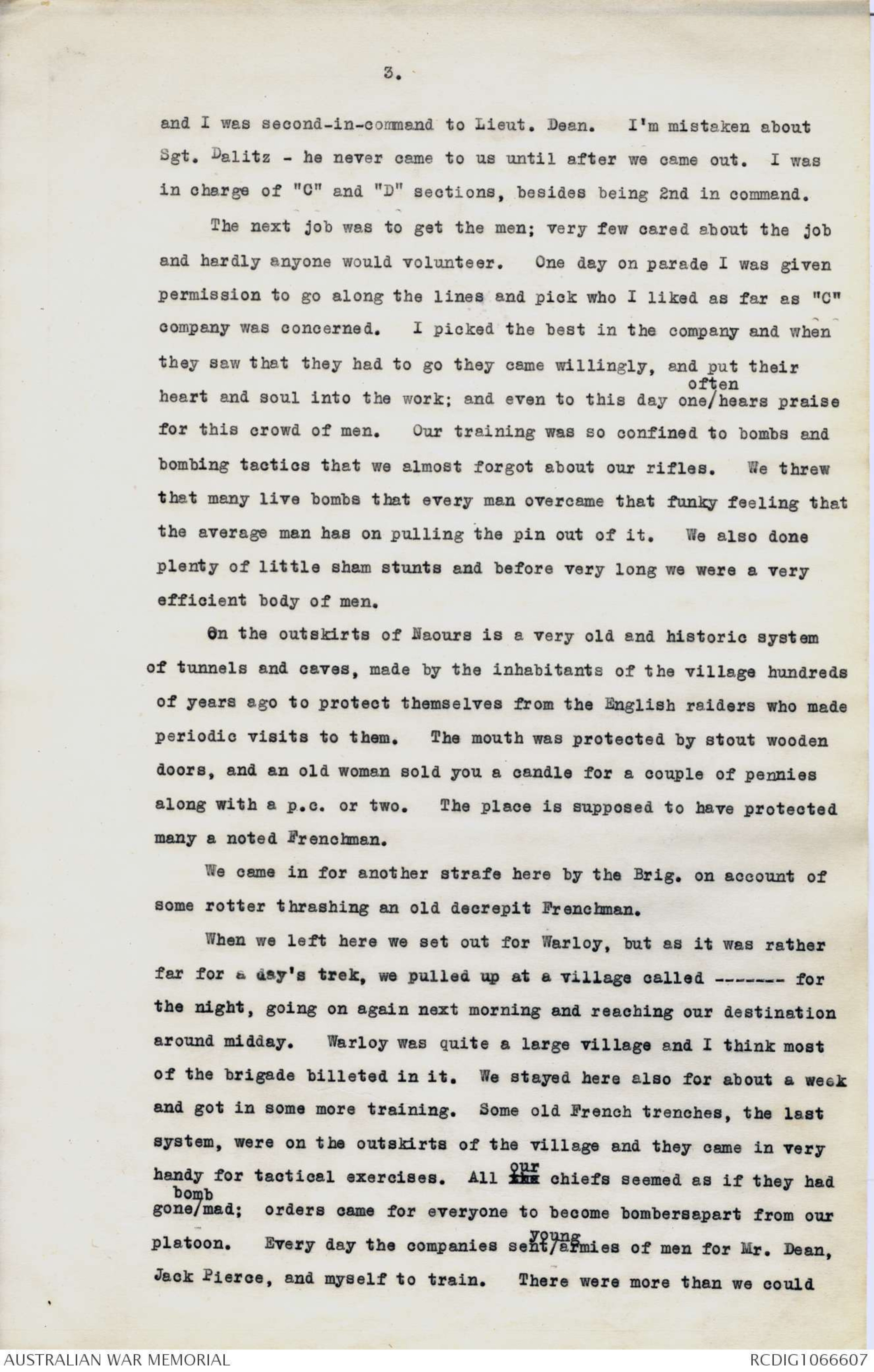
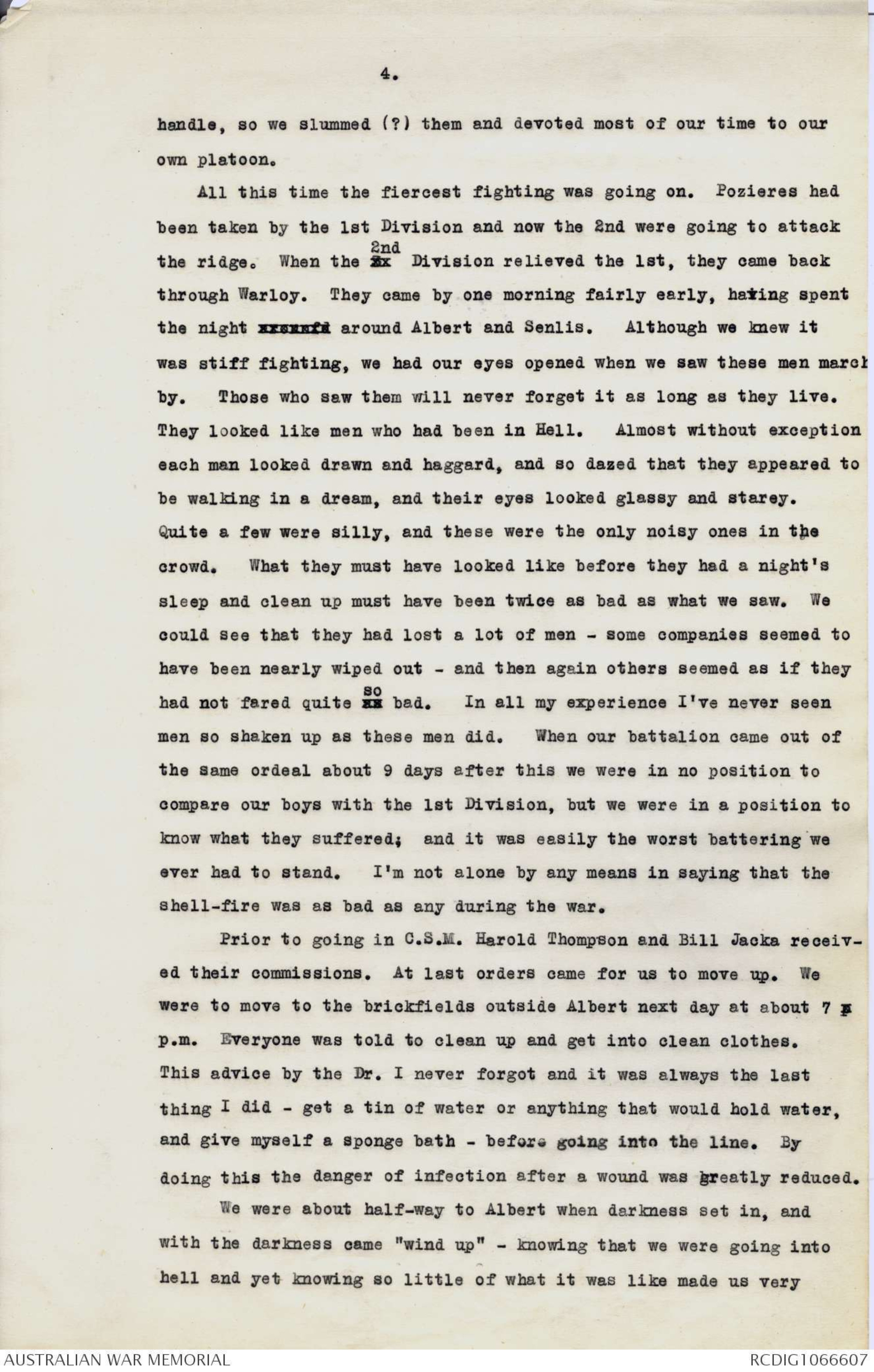
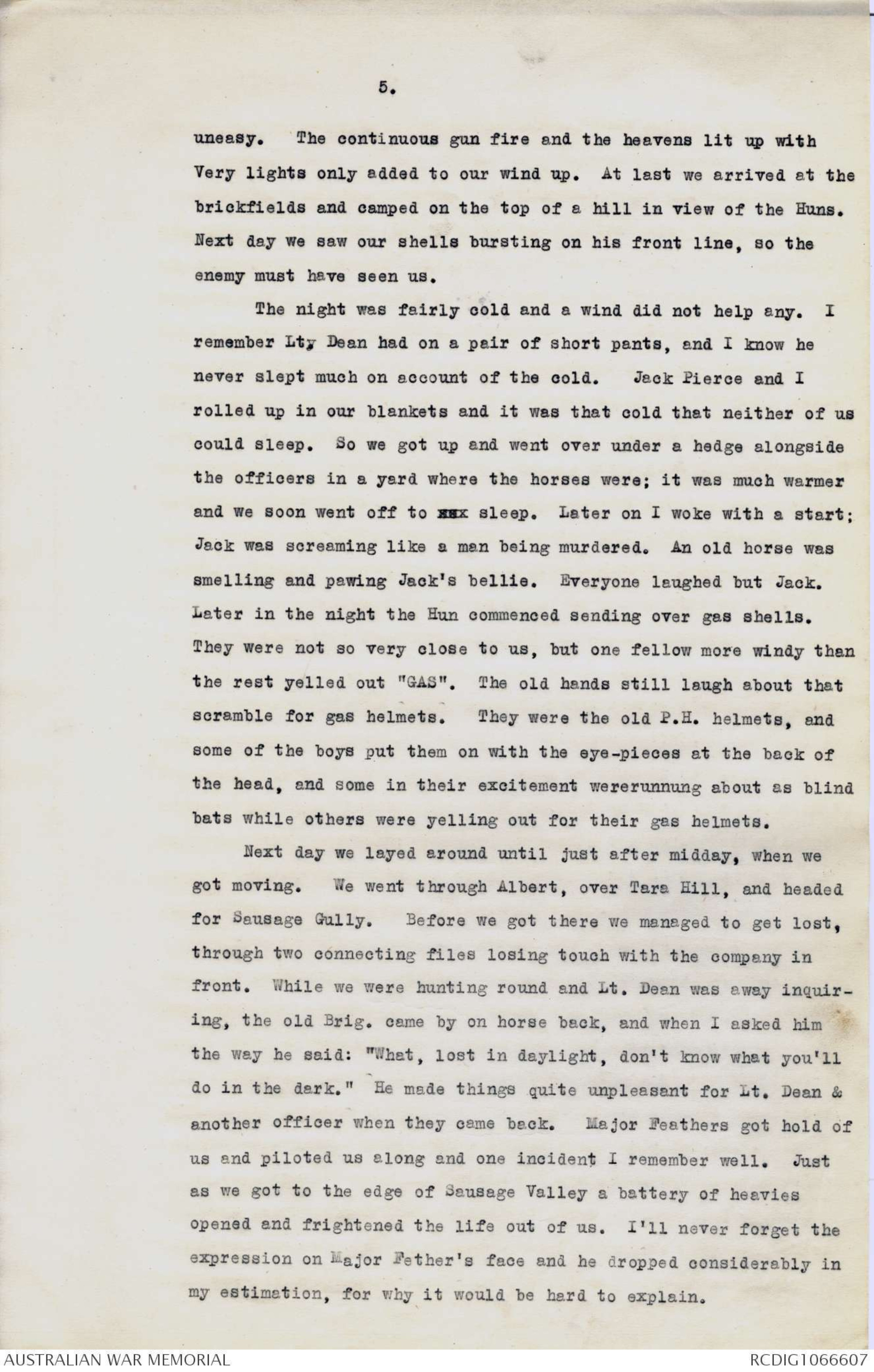
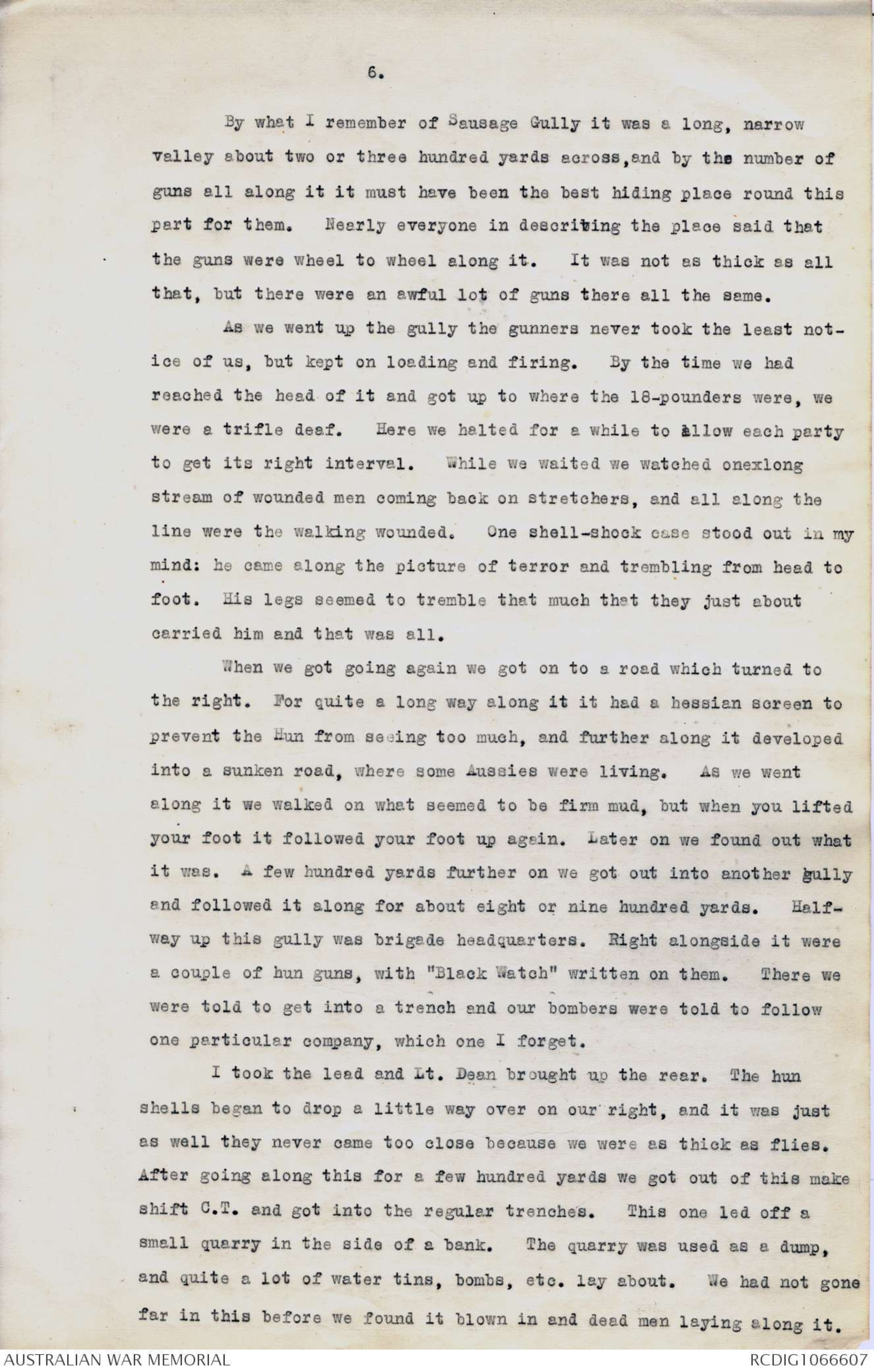
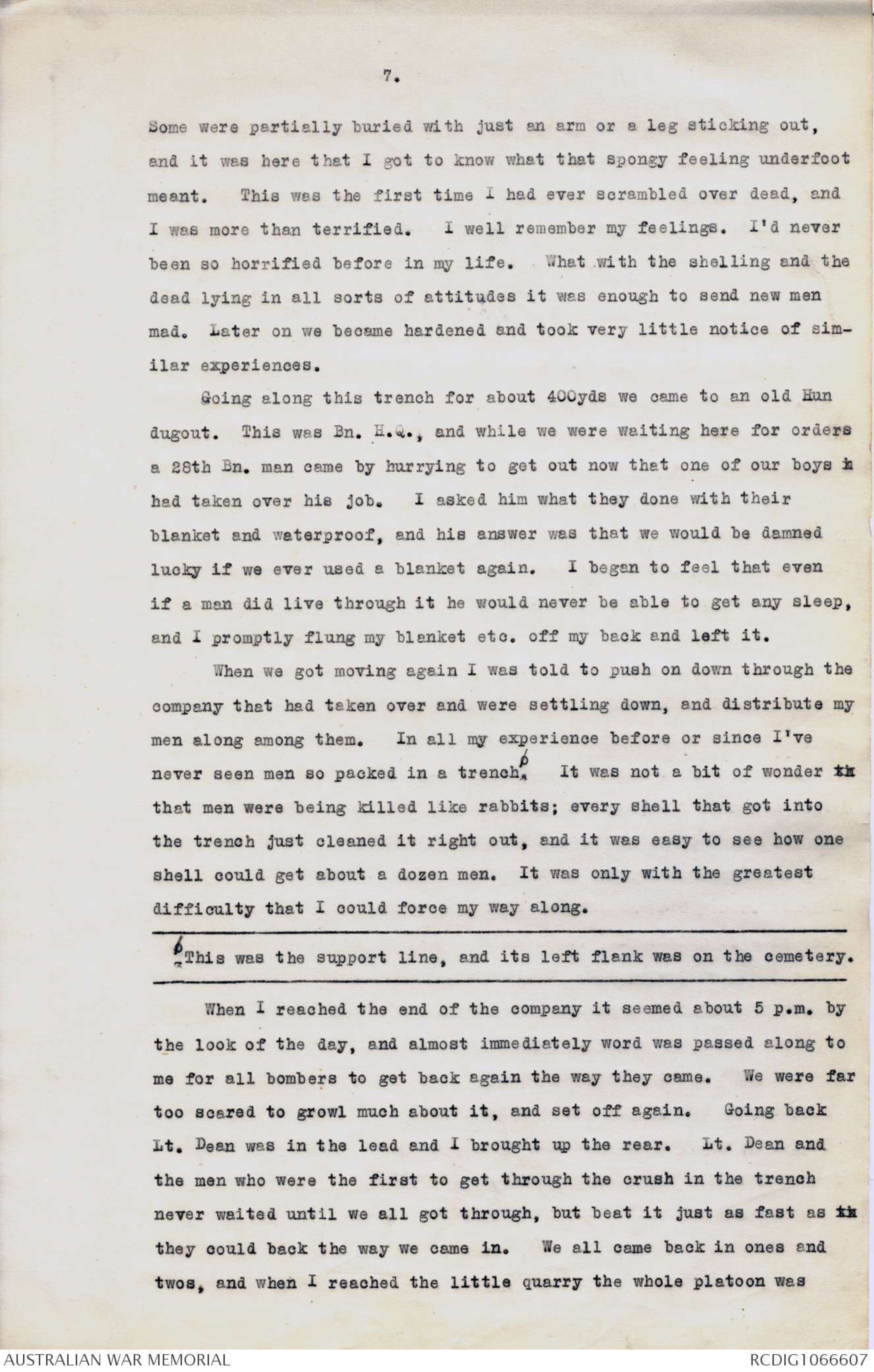
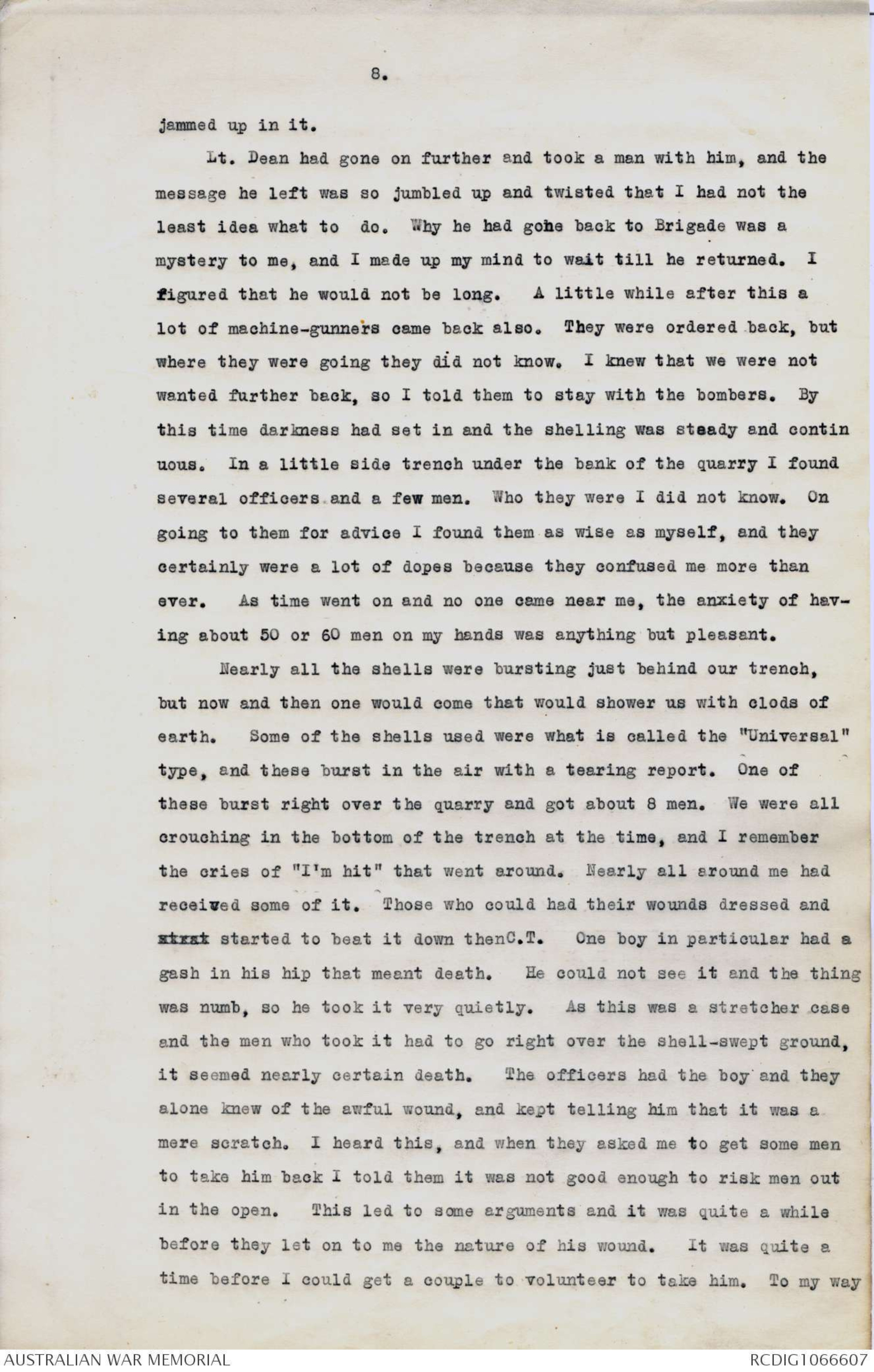
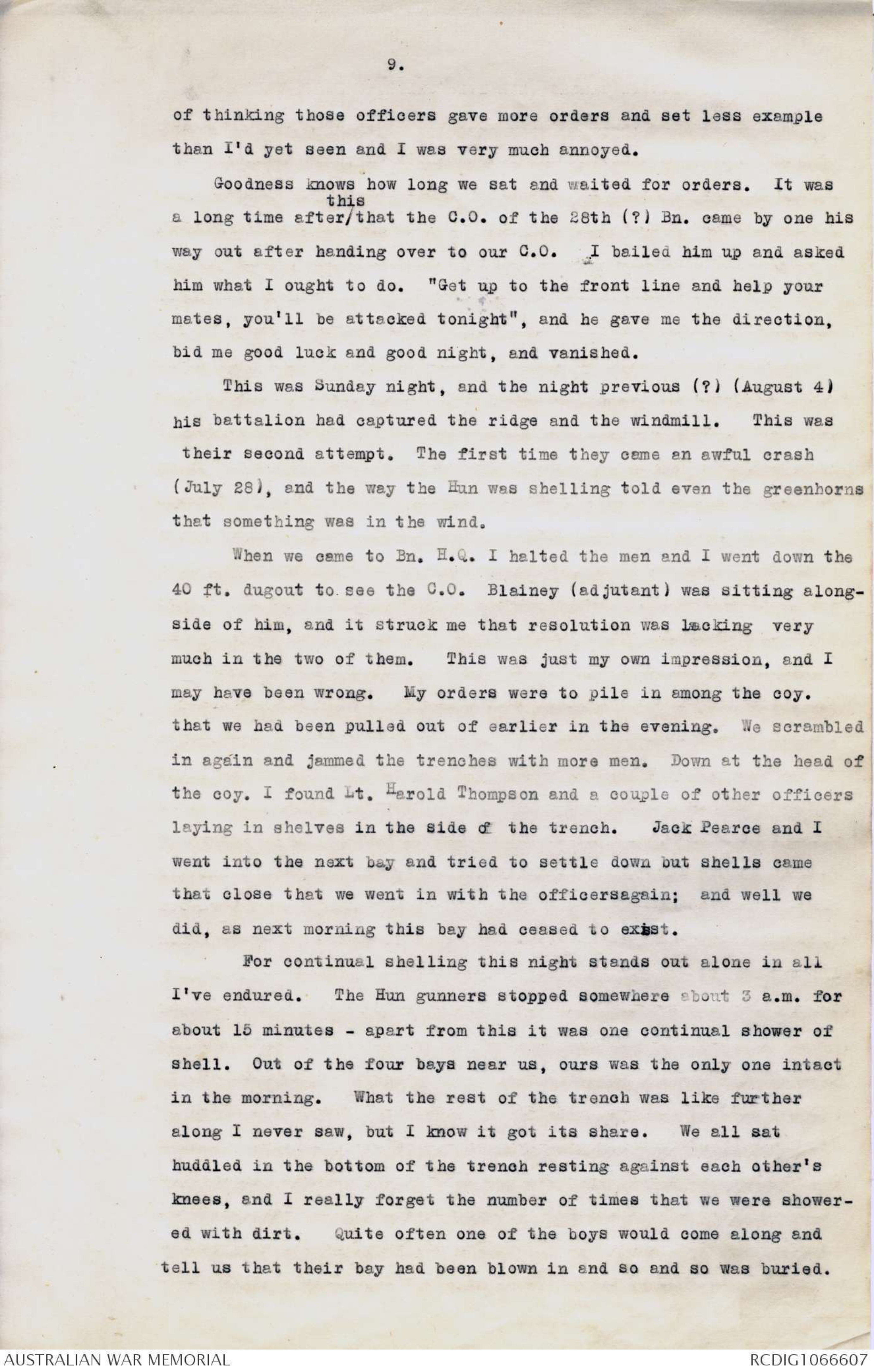
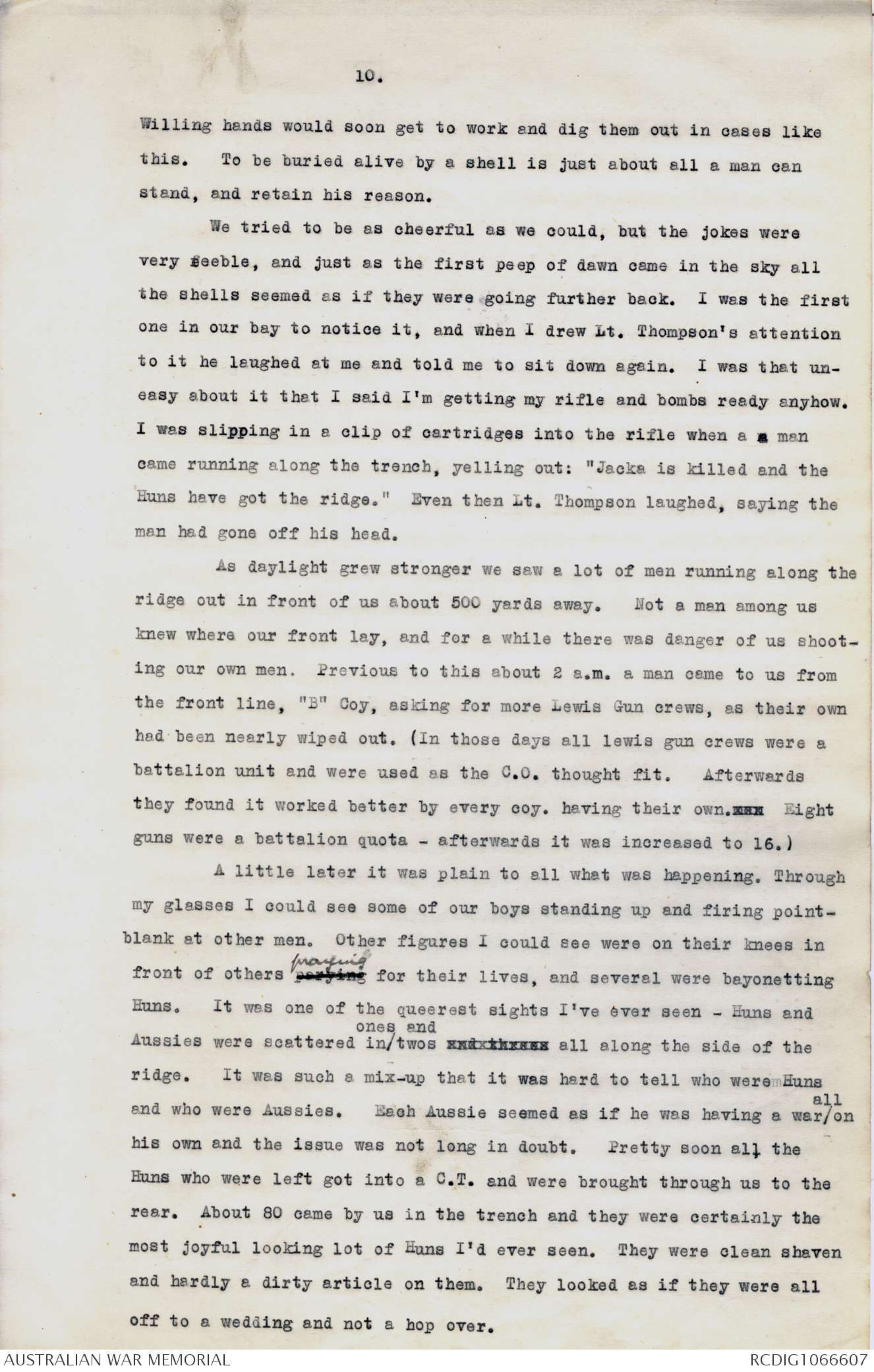
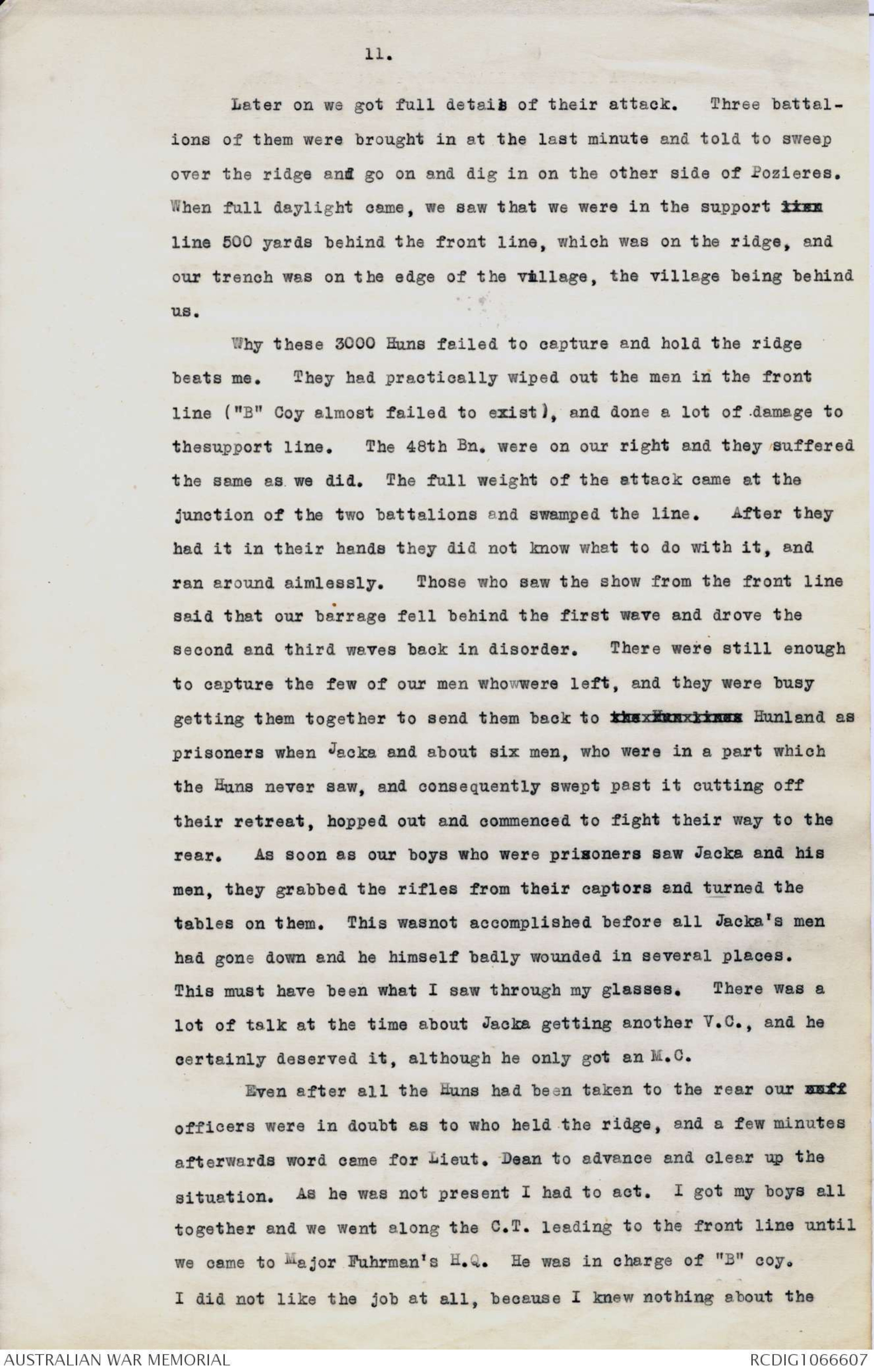
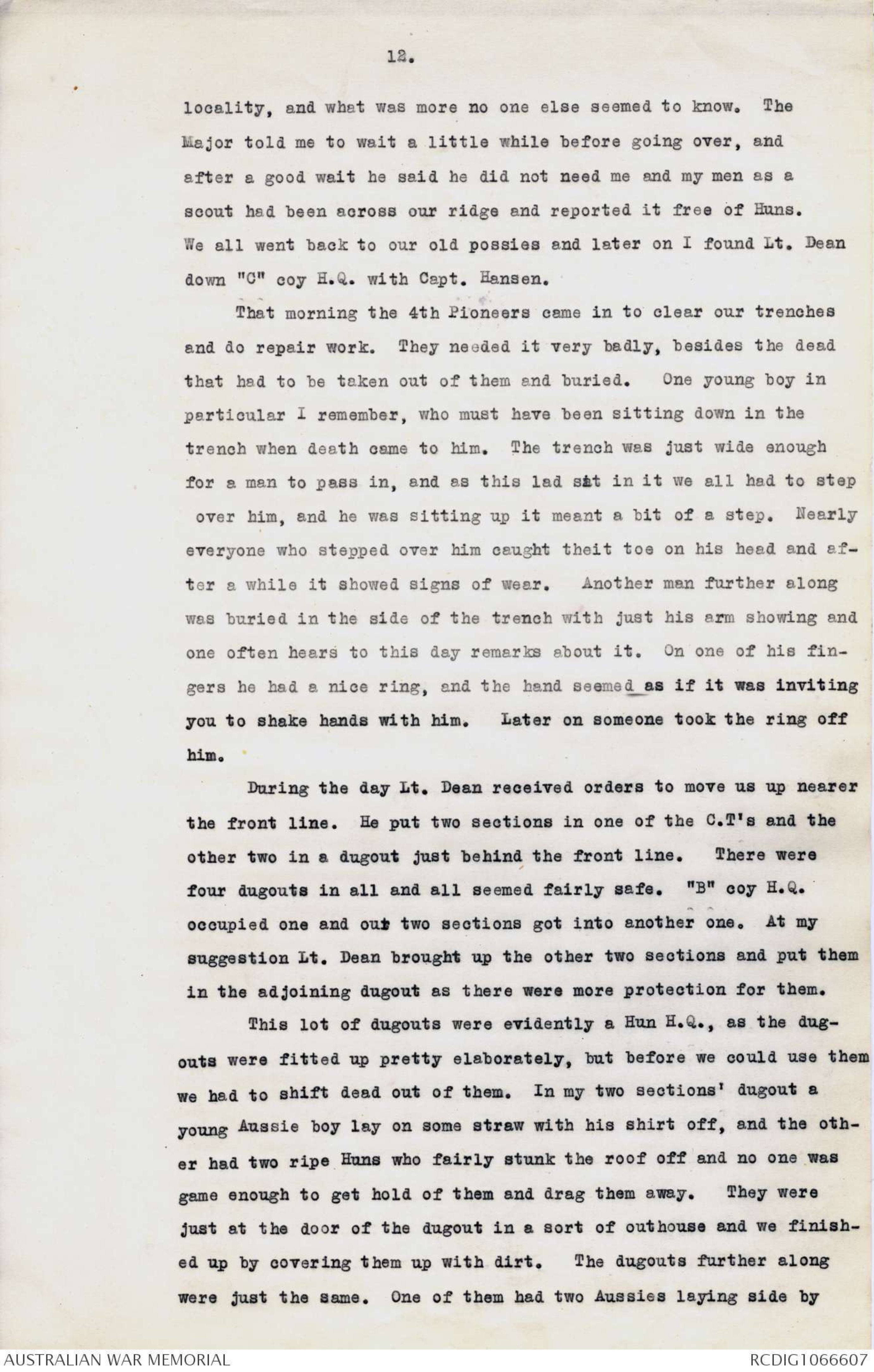
3.
and I was second-in-command to Lieut. Dean. I'm mistaken about
Sgt. Dalitz - he never came to us until after we came out. I was
in charge of "C” and "D" sections, besides being 2nd in command.
The next job was to get the men; very few cared about the job
and hardly anyone would volunteer. One day on parade I was given
permission to go along the lines and pick who I liked as far as "C"
company was concerned. I picked the best in the company and when
they saw that they had to go they came willingly, and put their
heart and soul into the work; and even to this day one ^often hears praise
for this crowd of men. Our training was so confined to bombs and
bombing tactics that we almost forgot about our rifles. We threw
that many live bombs that every man overcame that funky feeling that
the average man has on pulling the pin out of it. We also done
plenty of little sham stunts and before very long we were a very
efficient body of men.
On the outskirts of Naours is a very old and historic system
of tunnels and caves, made by the inhabitants of the village hundreds
of years ago to protect themselves from the English raiders who made
periodic visits to them. The mouth was protected by stout wooden
doors, and an old woman sold you a candle for a couple of pennies
along with a p.c. or two. The place is supposed to have protected
many a noted Frenchman.
We came in for another strafe here by the Brig. on account of
some rotter thrashing an old decrepit Frenchman.
When we left here we set out for Warloy, but as it was rather
far for a day's trek, we pulled up at a village called ------- for
the night, going on again next morning and reaching our destination
around midday. Warloy was quite a large village and I think most
of the brigade billeted in it. We stayed here also for about a week
and got in some more training. Some old French trenches, the last
system, were on the outskirts of the village and they came in very
handy for tactical exercises. All the our chiefs seemed as if they had
gone ^bomb mad; orders came for everyone to become bombersapart from our
platoon. Every day the companies sent ^young armies of men for Mr. Dean,
Jack Pierce, and myself to train. There were more than we could
4.
handle, so we slummed (?) them and devoted most of our time to our
own platoon.
All this time the fiercest fighting was going on. Pozieres had
been taken by the 1st Division and now the 2nd were going to attack
the ridge. When the 2x 2nd Division relieved the 1st, they came back
through Warloy. They came by one morning fairly early, having spent
the night xxxxxxx around Albert and Senlis. Although we knew it
was stiff fighting, we had our eyes opened when we saw these men march
by. Those who saw them will never forget it as long as they live.
They looked like men who had been in Hell. Almost without exception
each man looked drawn and haggard, and so dazed that they appeared to
be walking in a dream, and their eyes looked glassy and starey.
Quite a few were silly, and these were the only noisy ones in the
crowd. What they must have looked like before they had a night's
sleep and clean up must have been twice as bad as what we saw. We
could see that they had lost a lot of men - some companies seemed to
have been nearly wiped out - and then again others seemed as if they
had not fared quite xx so bad. In all my experience I've never seen
men so shaken up as these men did. When our battalion came out of
the same ordeal about 9 days after this we were in no position to
compare our boys with the 1st Division, but we were in a position to
know what they suffered; and it was easily the worst battering we
ever had to stand. I'm not alone by any means in saying that the
shell-fire was as bad as any during the war.
Prior to going in C.S.M. Harold Thompson and Bill Jacka received
their commissions. At last orders came for us to move up. We
were to move to the brickfields outside Albert next day at about 7 x
p.m. Everyone was told to clean up and get into clean clothes.
This advice by the Dr. I never forgot and it was always the last
thing I did - get a tin of water or anything that would hold water,
and give myself a sponge bath - before going into the line. By
doing this the danger of infection after a wound was greatly reduced.
We were about half-way to Albert when darkness set in, and
with the darkness came "wind up" - knowing that we were going into
hell and yet knowing so little of what it was like made us very
5.
uneasy. The continuous gun fire and the heavens lit up with
Very lights only added to our wind up. At last we arrived at the
brickfields and camped on the top of a hill in view of the Huns.
Next day we saw our shells bursting on his front line, so the
enemy must have seen us.
The night was fairly cold and a wind did not help any. I
remember Lt. Dean had on a pair of short pants, and I know he
never slept much on account of the cold. Jack Pierce and I
rolled up in our blankets and it was that cold that neither of us
could sleep. So we got up and went over under a hedge alongside
the officers in a yard where the horses were; it was much warmer
and we soon went off to sleep. Later on I woke with a start;
Jack was screaming like a man being murdered. An old horse was
smelling and pawing Jack's bellie. Everyone laughed but Jack.
Later in the night the Hun commenced sending over gas shells.
They were not so very close to us, but one fellow more windy than
the rest yelled out "GAS". The old hands still laugh about that
scramble for gas helmets. They were the old P.H. helmets, and
some of the boys put them on with the eye-pieces at the back of
the head, and some in their excitement wererunnung about as blind
bats while others were yelling out for their gas helmets.
Next day we layed around until just after midday, when we
got moving. We went through Albert, over Tara Hill, and headed
for Sausage Gully. Before we got there we managed to get lost,
through two connecting files losing touch with the company in
front. While we were hunting round and Lt. Dean was away inquiring,
the old Brig, came by on horse back, and when I asked him
the way he said: "What, lost in daylight, don't know what you'll
do in the dark." He made things quite unpleasant for Lt. Dean &
another officer when they came back. Major Feathers got hold of
us and piloted us along and one incident I remember well. Just
as we got to the edge of Sausage Valley a battery of heavies
opened and frightened the life out of us. I'll never forget the
expression on Major Fether's face and he dropped considerably in
my estimation, for why it would be hard to explain.
6.
By what I remember of Sausage Gully it was a long, narrow
valley about two or three hundred yards across, and by the number of
guns all along it it must have been the best hiding place round this
part for them. Nearly everyone in describing the place said that
the guns were wheel to wheel along it. It was not as thick as all
that, but there were an awful lot of guns there all the same.
As we went up the gully the gunners never took the least notice
of us, but kept on loading and firing. By the time we had
reached the head of it and got up to where the 18-pounders were, we
were a trifle deaf. Here we halted for a while to allow each party
to get its right interval. While we waited we watched onexlong
stream of wounded men coming back on stretchers, and all along the
line were the walking wounded. One shell-shock case stood out in my
mind: he came along the picture of terror and trembling from head to
foot. His legs seemed to tremble that much that they just about
carried him and that was all.
When we got going again we got on to a road which turned to
the right. For quite a long way along it it had a hessian screen to
prevent the Hun from seeing too much, and further along it developed
into a sunken road, where some Aussies were living. As we went
along it we walked on what seemed to be firm mud, but when you lifted
your foot it followed your foot up again. Later on we found out what
it was. A few hundred yards further on we got out into another gully
and followed it along for about eight or nine hundred yards. Halfway
up this gully was brigade headquarters. Right alongside it were
a couple of hun guns, with "Black Watch" written on them. There we
were told to get into a trench and our bombers were told to follow
one particular company, which one I forget.
I took the lead and Lt. Dean brought up the rear. The hun
shells began to drop a little way over on our right, and it was just
as well they never came too close because we were as thick as flies.
After going along this for a few hundred yards we got out of this make
shift C.T. and got into the regular trenches. This one led off a
small quarry in the side of a bank. The quarry was used as a dump,
and quite a lot of water tins, bombs, etc. lay about. We had not gone
far in this before we found it blown in and dead men laying along it.
7.
Some were partially buried with just an arm or a leg sticking out,
and it was here that I got to know what that spongy feeling underfoot
meant. This was the first time I had ever scrambled over dead, and
I was more than terrified. I well remember my feelings. I'd never
been so horrified before in my life. What with the shelling and the
dead lying in all sorts of attitudes it was enough to send new men
mad. Later on we became hardened and took very little notice of similar
experiences.
Going along this trench for about 400yds we came to an old Hun
dugout. This was Bn. H.Q., and while we were waiting here for orders
a 28th Bn. man came by hurrying to get out now that one of our boys i
had taken over his job. I asked him what they done with their
blanket and waterproof, and his answer was that we would be damned
lucky if we ever used a blanket again. I began to feel that even
if a man did live through it he would never be able to get any sleep,
and I promptly flung my blanket etc. off my back and left it.
When we got moving again I was told to push on down through the
company that had taken over and were settling down, and distribute my
men along among them. In all my experience before or since I've
never seen men so packed in a trench.∅ It was not a bit of wonder th
that men were being killed like rabbits; every shell that got into
the trench just cleaned it right out, and it was easy to see how one
shell could get about a dozen men. It was only with the greatest
difficulty that I could force my way along.
∅ This was the support line, and its left flank was on the cemetery.
When I reached the end of the company it seemed about 5 p.m. by
the look of the day, and almost immediately word was passed along to
me for all bombers to get back again the way they came. We were far
too scared to growl much about it, and set off again. Going back
Lt. Dean was in the lead and I brought up the rear. Lt. Dean and
the men who were the first to get through the crush in the trench
never waited until we all got through, but beat it just as fast as th
they could back the way we came in. We all came back in ones and
twos, and when I reached the little quarry the whole platoon was
8.
jammed up in it.
Lt. Dean had gone on further and took a man with him, and the
message he left was so jumbled up and twisted that I had not the
least idea what to do. Why he had gone back to Brigade was a
mystery to me, and I made up my mind to wait till he returned. I
figured that he would not be long. A little while after this a
lot of machine-gunners came back also. They were ordered back, but
where they were going they did not know. I knew that we were not
wanted further back, so I told them to stay with the bombers. By
this time darkness had set in and the shelling was steady and continuous.
In a little side trench under the bank of the quarry I found
several officers. and a few men. Who they were I did not know. On
going to them for advice I found them as wise as myself, and they
certainly were a lot of dopes because they confused me more than
ever. As time went on and no one came near me, the anxiety of having
about 50 or 60 men on my hands was anything but pleasant.
Nearly all the shells were bursting just behind our trench,
but now and then one would come that would shower us with clods of
earth. Some of the shells used were what is called the "Universal"
type, and these burst in the air with a tearing report. One of
these burst right over the quarry and got about 8 men. We were all
crouching in the bottom of the trench at the time, and I remember
the cries of "I'm hit" that went around. Nearly all around me had
received some of it. Those who could had their wounds dressed andstrat started to beat it down thenC.T. One boy in particular had a
gash in his hip that meant death. He could not see it and the thing
was numb, so he took it very quietly. As this was a stretcher case
and the men who took it had to go right over the shell-swept ground,
it seemed nearly certain death. The officers had the boy and they
alone knew of the awful wound, and kept telling him that it was a
mere scratch. I heard this, and when they asked me to get some men
to take him back I told them it was not good enough to risk men out
in the open. This led to some arguments and it was quite a while
before they let on to me the nature of his wound. It was quite a
time before I could get a couple to volunteer to take him. To my way
9.
of thinking those officers gave more orders and set less example
than I'd yet seen and I was very much annoyed.
Goodness knows how long we sat and waited for orders. It was
a long time after ^this that the C.O. of the 28th (?) Bn. came by one his
way out after handing over to our C.O. I bailed him up and asked
him what I ought to do. "Get up to the front line and help your
mates, you'll be attacked tonight", and he gave me the direction,
bid me good luck and good night, and vanished.
This was Sunday night, and the night previous (?) (August 4)
his battalion had captured the ridge and the windmill. This was
their second attempt. The first time they came an awful crash
(July 28), and the way the Hun was shelling told even the greenhorns
that something was in the wind.
When we came to Bn. H.Q. I halted the men and I went down the
40 ft. dugout to see the C.O. Blainey (adjutant) was sitting alongside
of him, and it struck me that resolution was lacking very
much in the two of them. This was just my own impression, and I
may have been wrong. My orders were to pile in among the coy.
that we had been pulled out of earlier in the evening. We scrambled
in again and jammed the trenches with more men. Down at the head of
the coy. I found Lt. Harold Thompson and a couple of other officers
laying in shelves in the side of the trench. Jack Pearce and I
went into the next bay and tried to settle down but shells came
that close that we went in with the officersagain; and well we
did, as next morning this bay had ceased to exist.
For continual shelling this night stands out alone in all
I've endured. The Hun gunners stopped somewhere about 3 a.m. for
about 15 minutes - apart from this it was one continual shower of
shell. Out of the four bays near us, ours was the only one intact
in the morning. What the rest of the trench was like further
along I never saw, but I know it got its share. We all sat
huddled in the bottom of the trench resting against each other's
knees, and I really forget the number of times that we were showered
with dirt. Quite often one of the boys would come along and
tell us that their bay had been blown in and so and so was buried.
10.
Willing hands would soon get to work and dig them out in cases like
this. To be buried alive by a shell is just about all a man can
stand, and retain his reason.
We tried to be as cheerful as we could, but the jokes were
very feeble, and just as the first peep of dawn came in the sky all
the shells seemed as if they were going further back. I was the first
one in our bay to notice it, and when I drew Lt. Thompson's attention
to it he laughed at me and told me to sit down again. I was that uneasy
about it that I said I'm getting my rifle and bombs ready anyhow.
I was slipping in a clip of cartridges into the rifle when a a man
came running along the trench, yelling out: "Jacka is killed and the
Huns have got the ridge." Even then Lt. Thompson laughed, saying the
man had gone off his head.
As daylight grew stronger we saw a lot of men running along the
ridge out in front of us about 500 yards away. Not a man among us
knew where our front lay, and for a while there was danger of us shooting
our own men. Previous to this about 2 a.m. a man came to us from
the front line, "B" Coy. asking for more Lewis Gun crews, as their own
had been nearly wiped out. (In those days all lewis gun crews were a
battalion unit and were used as the C.O. thought fit. Afterwards
they found it worked better by every coy. having their own. xxx Eight
guns were a battalion quota - afterwards it was increased to 16.)
A little later it was plain to all what was happening. Through
my glasses I could see some of our boys standing up and firing point-blank
at other men. Other figures I could see were on their knees in
front of others parying praying for their lives, and several were bayonetting
Huns. It was one of the queerest sights I've ever seen - Huns and
Aussies were scattered in ^ones and twos and threes all along the side of the
ridge. It was such a mix-up that it was hard to tell who were Huns
and who were Aussies. Each Aussie seemed as if he was having a war ^all on
his own and the issue was not long in doubt. Pretty soon all the
Huns who were left got into a C.T. and were brought through us to the
rear. About 80 came by us in the trench and they were certainly the
most joyful looking lot of Huns I'd ever seen. They were clean shaven
and hardly a dirty article on them. They looked as if they were all
off to a wedding and not a hop over.
11.
Later on we got full details of their attack. Three battalions
of them were brought in at the last minute and told to sweep
over the ridge and go on and dig in on the other side of Pozieres.
When full daylight came, we saw that we were in the support lien
line 500 yards behind the front line, which was on the ridge, and
our trench was on the edge of the village, the village being behind
us.
Why these 3000 Huns failed to capture and hold the ridge
beats me. They had practically wiped out the men in the front
line ("B" Coy almost failed to exist), and done a lot of damage to
thesupport line. The 48th Bn. were on our right and they suffered
the same as we did. The full weight of the attack came at the
junction of the two battalions and swamped the line. After they
had it in their hands they did not know what to do with it, and
ran around aimlessly. Those who saw the show from the front line
said that our barrage fell behind the first wave and drove the
second and third waves back in disorder. There were still enough
to capture the few of our men whowwere left, and they were busy
getting them together to send them back to the Hun lines Hunland as
prisoners when Jacka and about six men, who were in a part which
the Huns never saw, and consequently swept past it cutting off
their retreat, hopped out and commenced to fight their way to the
rear. As soon as our boys who were prisoners saw Jacka and his
men, they grabbed the rifles from their captors and turned the
tables on them. This wasnot accomplished before all Jacka's men
had gone down and he himself badly wounded in several places.
This must have been what I saw through my glasses. There was a
lot of talk at the time about Jacka getting another V.C., and he
certainly deserved it, although he only got an M.C.
Even after all the Huns had been taken to the rear our ooff
officers were in doubt as to who held the ridge, and a few minutes
afterwards word came for Lieut. Dean to advance and clear up the
situation. As he was not present I had to act. I got my boys all
together and we went along the C.T. leading to the front line until
we came to Major Fuhrman's H.Q. He was in charge of "B" coy.
I did not like the job at all, because I knew nothing about the
12.
locality, and what was more no one else seemed to know. The
Major told me to wait a little while before going over, and
after a good wait he said he did not need me and my men as a
scout had been across our ridge and reported it free of Huns.
We all went back to our old possies and later on I found Lt. Dean
down "C" coy H.Q. with Capt. Hansen.
That morning the 4th Pioneers came in to clear our trenches
and do repair work. They needed it very badly, besides the dead
that had to be taken out of them and buried. One young boy in
particular I remember, who must have been sitting down in the
trench when death came to him. The trench was just wide enough
for a man to pass in, and as this lad sat in it we all had to step
over him, and he was sitting up it meant a bit of a step. Nearly
everyone who stepped over him caught theit toe on his head and after
a while it showed signs of wear. Another man further along
was buried in the side of the trench with just his arm showing and
one often hears to this day remarks about it. On one of his fingers
he had a nice ring, and the hand seemed as if it was inviting
you to shake hands with him. Later on someone took the ring off
him.
During the day Lt. Dean received orders to move us up nearer
the front line. He put two sections in one of the C.T's and the
other two in a dugout just behind the front line. There were
four dugouts in all and all seemed fairly safe. "B" coy H.Q
occupied one and out two sections got into another one. At my
suggestion Lt. Dean brought up the other two sections and put them
in the adjoining dugout as there were more protection for them.
This lot of dugouts were evidently a Hun H.Q., as the dugouts
were fitted up pretty elaborately, but before we could use them
we had to shift dead out of them. In my two sections' dugout a
young Aussie boy lay on some straw with his shirt off, and the other
had two ripe Huns who fairly stunk the roof off and no one was
game enough to get hold of them and drag them away. They were
just at the door of the dugout in a sort of outhouse and we finished
up by covering them up with dirt. The dugouts further along
were just the same. One of them had two Aussies laying side by
 Sandy Mudie
Sandy MudieThis transcription item is now locked to you for editing. To release the lock either Save your changes or Cancel.
This lock will be automatically released after 60 minutes of inactivity.